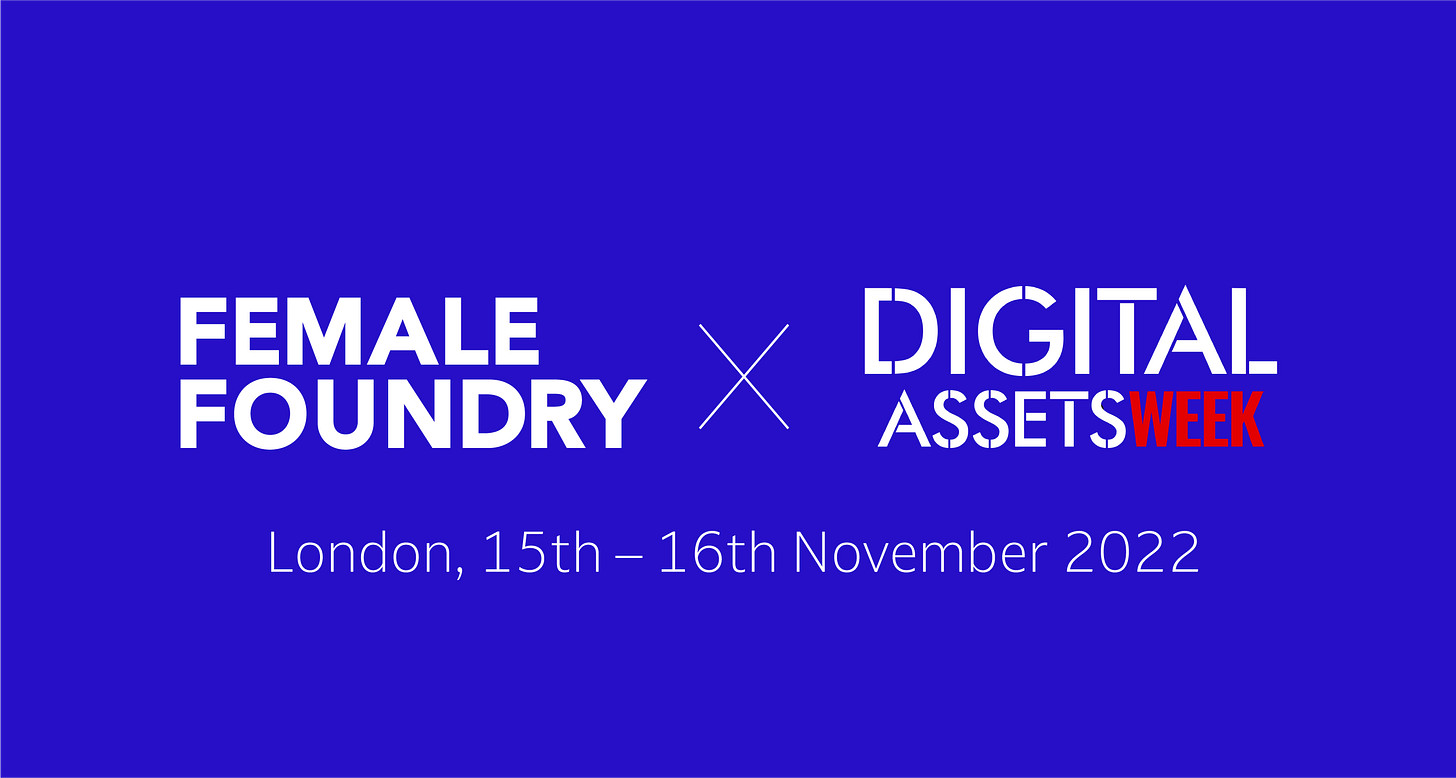Female Foundry Week 46: COP27. Employee options pool playbook. SPACs party is over. Why lead velocity rate matters. Emerging managers are feeling the chill.
Welcome to The Week 46, 2022 Edition of the Female Foundry newsletter!

Female Foundry - where female investors and founders meet.
In The News
Barcelona-based counterfeiting prevention startup Red Points, founded by Laura Urquizu, snaps a €20m round led by Iris Capital; Munich-based VEGDOG, co-founded by Tessa Zaune-Figlar and Valerie Henssen, raises a €3.5m Series A round led by Green Generation Fund to bring sustainability to pet food; London-based teen health and well-being app Luna, co-founded by Jasmine Schembri and Jo Goodall, fetches £600k Pre-Seed round from multiple investors, including Octopus First Check Fund; London-based Vektor AI, co-founded by Anna Buldakova, bags a €2.4m Pre-seed round led by Cherry Ventures and Mosaic Ventures to launch new employee mentorship platform; Austrian deep-tech startup Sarcura, co-founded by Daniela Buchmayr, raises a €7m Series A round from Lansdowne Investment Company to revolutionise cell therapy manufacturing.
Theranos founder Elizabeth Holmes has been sentenced to more than 11 years in prison for defrauding investors - closing a key chapter to one of the biggest scandals in Silicon Valley’s history and casting a long shadow on the startup female founder community. Read full story ➯
Spotlight
The race to save the planet - COP27 and the rise of climate tech.
Hundreds of world leaders, climate groups and activists flocked to Egypt for COP27, the largest annual gathering on climate action that ended this Friday. Based on PwC’s State of Climate Tech 2022 report published just two weeks ago, climate tech VC funding has soared in 2022 and over $50bn in VC money has been injected into climate tech companies this year alone - representing over a quarter of every venture dollar invested. However, COP27 estimates that an additional one trillion dollars will be needed to tackle climate change. As part of COP27, the European Innovation Fund has pledged to commit €250m with five equity funds, focusing on food innovation, renewable energy, energy efficiency, the circular economy, the blue economy and water, to mobilise €2.5bn of climate action investment across Europe. The UK government has also committed to triple its climate funding to £1.5bn in 2025. Read full story ➯
Are you building a climate tech startup? Check these VC tips on how to raise funding. Read full story ➯
Fundraising
Lead velocity rate - what is it and why it matters.
In the current uncertain market conditions, it might seem even harder to estimate your startup’s future revenue potential and growth. Sales pipeline, and sales velocity, which measures how quickly deals move through your pipeline and generate revenue, are both lagging and therefore misleading metrics. Lead velocity rate (LVR), however, that focuses on the growth of the number of leads coming into your pipeline, not how fast leads are moving through that pipeline, allows you to track growth in real-time - and that’s exciting. LVR uses month-on-month qualified lead growth, so when you fall below the benchmarked threshold, you can immediately take action and still finish off the month strong. Also, while sales figures will always fluctuate, lead generation should remain on a steady (upward) trajectory. How do you calculate lead velocity rate? What is considered a good LVR? Read here ➯ I would also recommend this article from a16z that simply breaks down the creation of a sales pipeline.
Employee options pool playbook.
Creation of an employee options pool (or ESOP) can be a useful way for your startup to attract top talent, incentivise employees and help your company grow. An employee options pool represents a portion of ownership in a company, therefore its creation impacts the ownership stake of founders and existing investors, making it often an important negotiation point between new investors and founders when raising an investment round. The common practice is for every startup to have a 10-20% employee pool allocated (depending on its maturity and projected growth path) and for the pool to be carved out from the pre-money valuation, diluting the founders and existing investors. I am sharing the most comprehensive ESOP guide I know. Read here ➯
How should you negotiate an options pool? Read here ➯ This country-by-country chapter is also useful to check which countries are the most favourable for stock options from a tax perspective.
Analysis
SPACs party is over.
Over the past three years, SPACs have captured the attention (and imagination) of a number of investors. 2020 and 2021 saw the biggest boom of SPACs - in 2020 alone, SPACs, astonishingly, accounted for over 50% of new publicly listed companies in the US. However, accelerated inflation and dramatically increased interest rates in Q3 2022, have dampened the risk appetite of investors, bringing the SPAC frenzy to a close. According to EY Global IPO Trends the number of SPACs that went public in the US plummeted by 88% in 2022 - so far this year, SPAC IPOs have attracted $11.8bn in the US. Similarly, the number of SPACs that went public in Europe also dropped by 25%. So far this year, SPACs in Europe, have raised $2.2bn, down from $5.11bn at the same point in the prior year. Is the SPAC fairytale over? With more funds liquidating their SPAC vehicles and valuations plummeting, whats next for SPACs? Read full story ➯
Emerging managers are feeling the chill.
Raising a first-time fund has never been easy: managing LP engagement, leveraging a limited small-ticket investment record, building up a mouth-watering deal flow and developing a uniqely-positioned-and-perfectly-aligned investment thesis are just a few of the key elements emerging managers need to get right in order to secure capital. In Q1-Q3 2022, there have been just 39 first-time vehicles created in Europe that raised a total of €2.6bn of funding, according to PitchBook. If this slow pace continues, this year's first-time fund count could be at its lowest since 2015. The increased need of LPs for liquidity in the current market environment, driven by a drastic decrease in valuations in public equity investments and the dramatic decrease in the value of institutional portfolios are mostly to blame, and emerging managers - “the most risky class” - are taking the hit. What are the implications of this trend? Read full story ➯ I also recommend this article sharing a few complementary ideas.
From The Community
Digital Assets Week has ended. Here is my debrief of key ideas.
The London edition of Digital Assets Week presented a series of events this week for institutional grade digital asset solutions and attracted some of the important names in the ecosystem to talk about the future of digital assets. Unsurprisingly, this year's edition was set against the FTX collapse, and the conversations put emphasis on the need for crypto regulation, including the regulation of stable coins, customer protection, safe custody, transparent collateralization and reporting, and strategic government policies to ensure implementation of all of that. It is always easier said than done, but the quality of thought presented left me with hope that whatever the answers might be, the industry is now committed more than ever to finding them.
Hiring
Check Female Foundry Job Board, and join female-founded startups.
Peppy ➯ Partnerships Manager | Red Points ➯ Data Analyst | Plan A ➯ Sales Representative (DACH)
That’s all for this week. Have a great rest of the weekend!
Agata
Written by Agata Nowicka, a founder of Female Foundry, a serial entrepreneur and an investor based in London.
Suggestions? Drop me an email.
Check femalefoundry.co for more fundraising tools and investor content. View other Female Foundry articles.




